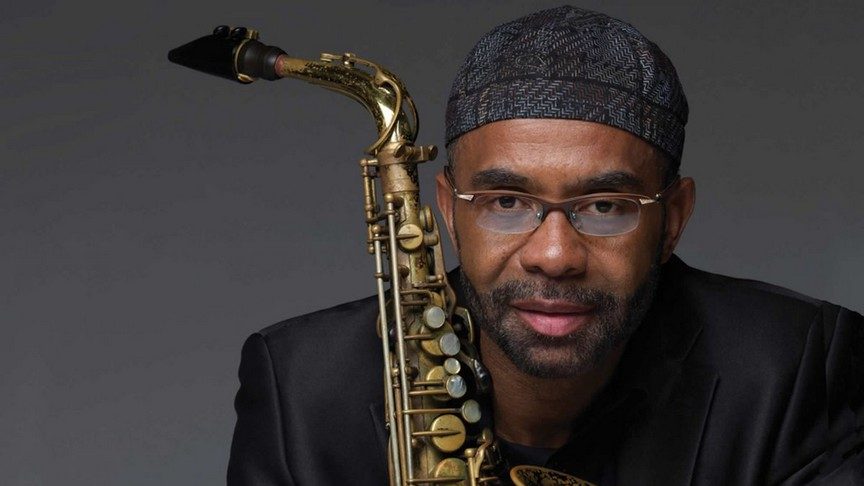Mic Check: Detroit native Kenny Garrett brings lifetime of music experiences to the DSO stage
The Grammy-winning artist will return to Detroit on Friday, Feb. 23 to perform his latest album, “Sounds from the Ancestors.”

Detroit native and Grammy-winning saxophonist Kenny Garrett.
For nearly four decades, Grammy-winning saxophonist Kenny Garrett has built a career that has seen him become recognized as one of the most versatile artists in jazz with his ability to contextualize jazz, blues and R&B within a world music framework.
The Detroit native got his start in music from his father, a carpenter who played tenor saxophone and exposed his son to the instrument. Upon high school graduation, Garrett was invited to join the Duke Ellington Orchestra, then led by Ellington’s son Mercer. The experience would develop Garrett’s chops and teach him many important music and life lessons.
Listen: Detroit native Kenny Garrett brings a lifetime of music experiences to the DSO stage
The following interview has been edited for clarity and length.
On what he learned from playing with the Duke Ellington Orchestra:
The most important lesson I got with the Ellington band was learning about Duke’s music and sitting under people like Harold Minard and Norris Turney, who were the protégés of Johnny Hodges, and having the opportunity to play with Cootie Williams.
What I learned from them was how to blend with an ensemble of 18 musicians. It helped me later on in my career to play with artists like Miles Davis, Freddie Hubbard and Woody Shaw, because I wanted to be like one horn with them when I played with them. That was a great lesson that I got with the Duke Ellington Orchestra.
On the life and music lessons he gleaned during his tenures with Miles Davis, Freddie Hubbard and Woody Shaw and how that was added to his musical toolkit:
Miles Davis
My time with Miles was my longest tenure. I was part of his band for five and a half years. When I played with Miles, he would play a line and I would play the line back. He never told me to do that. I just started doing that by instinct. That became part of the show. That is how I really started learning the language (of music). It was like an African tradition because Miles would play the language, and I would learn it. Charlie Parker stood on the bandstand with Miles as did John Coltrane, and they were my heroes. I was simply happy to have that opportunity (to follow in their footsteps).
Freddie Hubbard
Miles Davis was playing a distinctive style of music when I played with him. Freddie was still playing standards and playing his original music. And he was FIRE. When we would go to play, I never heard him warm up. He would always come ready to play and I found that intriguing. Freddie played like he had something to prove every day. He was always on the top of his game.
Woody Shaw
I learned a lot from Woody harmonically. Woody and I were closer in age, and I would pick him up and we would drive around and talk about books, life and music. Plus, my roommates at that time, Tony Reedus and Mulgrew Miller were playing with Woody, and he would sometimes open up his set or bandstand on a Sunday night and let me sit in and play. He was not really looking for an alto sax player. But after sitting in a few times and a few of his friends (especially his girlfriend) expressing how they liked my playing style, I eventually ended up playing in his band.
On recording his latest album, “Sounds from the Ancestors”:
“Sounds from the Ancestors” reflects Detroit. I wanted to go back to my roots. Growing up and listening to the Motown Sound gave me a great feeling when I was a kid. I wanted to go back and capture that feeling while tapping into various sources like Afro Cuban music. That is one of the advantages of Detroit, there’s just so much music to be exposed to. Another bonus about the album was that it was recorded during the pandemic. I got a chance to slow down and develop some of the album themes that I wouldn’t have been able to do on a faster-paced schedule.
On what it’s like to carry the Detroit music tradition all over the world:
When you say you are from Detroit there is usually a lot of respect that immediately comes with it. For me, I always wanted to make my family happy and be proud of me. I wanted my teachers like Marcus Belgrave and Bill Wiggins to be happy and proud of me. I wanted people to know that I was representing Detroit, even if I didn’t say that because it’s a certain level of musicianship that we have, when you come from Detroit.
On his upcoming performance at the Detroit Symphony Orchestra:
Anytime I come home to play, it’s always something special because I’m always thankful for all the blessings that I was able to receive. I always want to play for the folks and show them what I’ve learned and that I’m still representing Detroit.
To stay updated on various tour dates, releases and artist activities, visit kennygarrett.com. To learn more about Garrett’s upcoming Feb. 23 show at the DSO or to purchase tickets, visit dso.org.
Support the shows you love.
WDET’s unique music programs are dedicated to exploring the music and culture of our region and the world.
Keep the music going. Please make a gift today.

